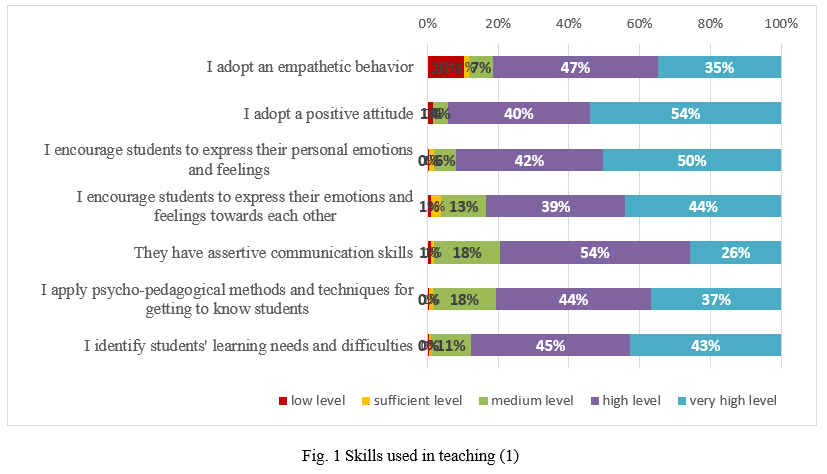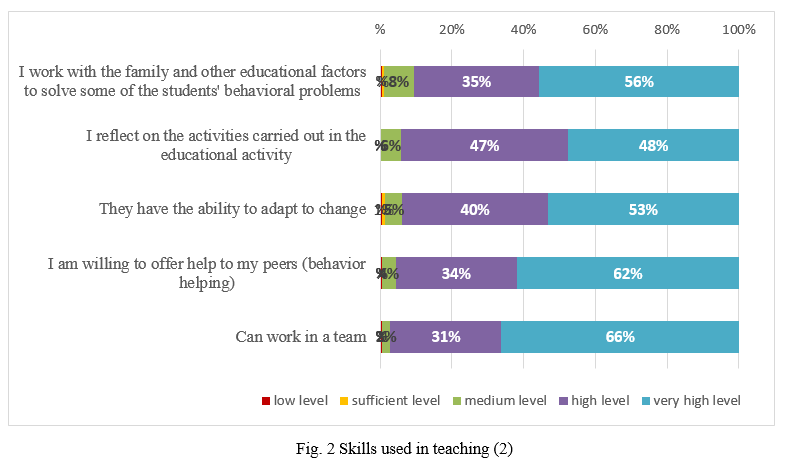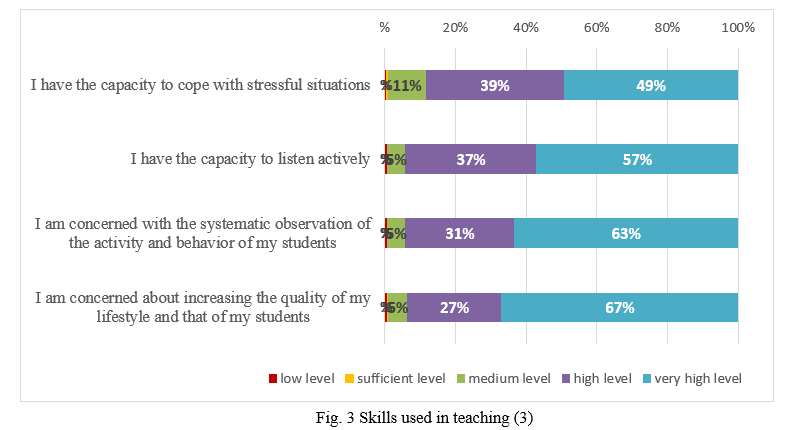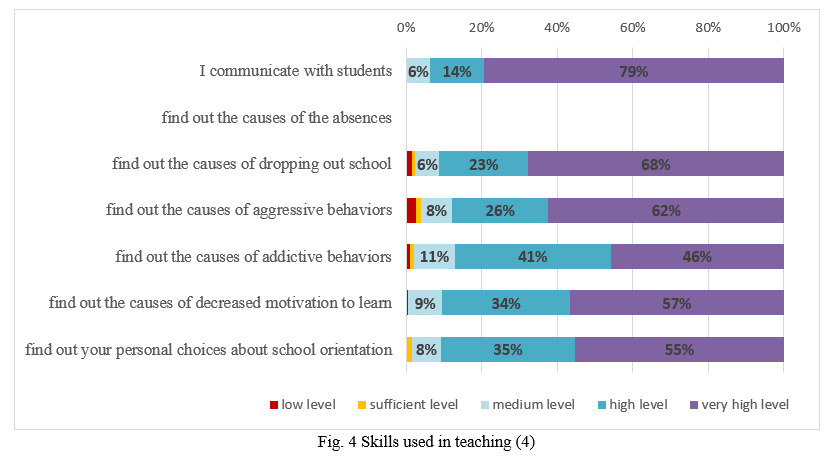Abstract
This paper concentrates on the review of the relationship between participation in training programs and the acquisition of skills and competencies related to educational counseling. To do education means to have an impact on learners’ behaviors, or in order for this impact to have desirable outcomes, it is crucial that teachers and the actor guiding the behavior modelling process to be equipped with specific psycho-pedagogical skills, and counseling skills. The methodological approach consisted of a quantitative (statistical) and qualitative (content) analysis, to provide a better profile of the professional behavior of the teacher. Data were collected based on the research questionnaire, with the aim to investigate teachers’ role and behaviors while performing educational activities, especially physically mediated and behaviors in developing and maintaining their relationships with the students. Additionally, research indicators have been elaborated to assess teachers’ skills that are close, precursors, to the specifics of counseling activity. The findings showed that the most typical skills used in daily activities that can be developed or improved are the following: assertive communication and methods and techniques of psycho-pedagogical knowledge of students. The research results provide an important technique that can be used in administrative and educational process for conducting educational counselling and improving teachers’ efficacy in providing educational counselling. The findings presented may be the basis for capturing the relevance of future continuing education programs.
Keywords: Continuing education programs, educational counseling, students, teachers
Introduction
Teacher education and training also needs to change. This is true for initial training, but also for continuing education.
Regardless of how teachers are initially trained, we cannot expect them to be prepared for all the challenges they will face throughout their careers. Therefore, education systems seek to provide teachers with opportunities for professional development in the workplace in order to maintain a high standard of teaching and maintain a high quality workforce (Eurydice, 2004).
It is crucial that educational reforms focus on teacher training, as they play a dual role: we must make sure that teachers are - and will be competent -, and also, we must make sure that they remain motivated over time.
The concept of professional development can be understood as a dynamic and continuous process, directed or unsystematic, through which a person develops his skills and attitudes according to the educational values specific to the teaching profession, builds his professional ethics, enriches and transforms his own professional identity (Donnay & Charlier, 2006; Păun, 2002).
Professional development includes both formal learning experiences of teachers (completion of an initial teacher training program, participation in workshops, professional meetings, mentoring, research activities, etc.) and non-formal and informal experiences conducted individually, or in informal groups, without assistance and outside of formal learning programs and activities, through self-instruction or exchanges of experience, by participating in scientific, psycho-pedagogical and methodological actions, reading professional publications, joining study groups with other teachers, etc.
In the paper entitled Educational Counseling, the author Dimitriu-Tiron (2005) argues that in the conditions of freedom of expression, of democratization of social life, education necessarily discovers its dimension of counseling in interaction with that of information and training of the human personality, with the one of mediating the social transformations, with the one of managing and solving the educational problem.
Besides the family group, schools provide learners with important conditions for the socialization in safe settings, where they are guided and supported by teachers. The teacher become the central figure and a resourceful actor in socialization process (Kline & Silver, 2004).
Considered as the main support system for students, teachers facilitate the learning process by guiding and directing learning behaviors of pupils, observes them in several settings, and provide mentorship due to their professional skills gained through continuous psycho-pedagogical training.
The students' state of mind, the challenges they face or may experience at home, inappropriate interaction with peers, can be easily spotted by teachers based on a constantly carried out observational process. It is important that teachers receive in their professional development necessary strategies, tools and techniques to overcome several challenging behaviors that might occur as a consequence of a specific deficit (Folostina et al., 2022).
Teachers' roles imply also an efficient and effective classroom management and mediation, and the ability to reduce and/or prevent inappropriate behaviors, disciplinary misconduct, and demands all the while meeting all students' needs in the classroom (Kottler & Kottler, 2007; Tabacaru Dumitru et al., 2022).
Maintaining a school positive and inclusive climate represents another important role of a teacher, and it is developed and maintained in a safe, secure, positive and respectful environment, which has a direct impact on students’ academic and social outcomes (Elias & Weissberg, 2000).
Each teacher in the school has the mission to contribute to the achievement of a perfect harmonization of the cognitive side with the affective, behavioral, attitudinal and social side.
In today's European context, each individual must be adaptable, flexible and lifelong learning. Each person must be tolerant and accept the different opinions of others, taking into account the new context of multiculturalism. The role of the teacher is extremely important considering that he is the one who has to train these skills in students, included in the educational process.
To achieve these goals, the teacher must have knowledge in various fields, not only in the subject of teaching in his specialty, but also to use various teaching techniques and methods to stimulate students, to be participatory.
Problem Statement
The analysis of the training through vocational training courses highlighted the fact that a very low share of the research participants had and took advantage of the opportunity to train their skills in the field of educational counseling.
An analysis of continuing education courses and course providers was required to assess the range of courses available locally and nationally.
A careful study of the centralizer of continuing education programs for teachers in Romania found that there are relatively few providers (13) of accredited continuing education programs, focused on training / developing skills / competencies in the field of educational counseling (Table 1).
At the level of Arges County, there is a deficit of accredited continuing education program providers focused on the training / development of skills / competences in the field of educational counseling for teachers in pre-university secondary and high school education.
Following the analysis of the training courses for the educational counselling skills followed, the ones provided by the institutions from the CCD network stood out, but among the suppliers we also find some school inspectorates and non-profit associations. A relatively small number of these courses are directly aimed at counselling, but there are several categories of courses that address topics specific to this activity: inclusive education, school-family relationship, parent education, temperament / behaviour of students. The most mentioned competencies acquired after training in educational counselling are those related to the ability to manage and respond to unforeseen situations, general counselling skills, skills for effective management of crisis or conflict situations, skills that allow better knowledge and student understanding (psychological training).
Research Questions
We did not limit ourselves only to the analysis of the courses taken and the skills acquired and we considered it necessary to investigate the skills used by research participants that can be acquired /developed after training courses, and especially those skills that they consider essential in carrying out the teaching activity.
We therefore asked the respondents what skills they apply in their regular teaching activity and how often they are used to help us identify those that need to be trained / developed through training programs.
Purpose of the Study
This article concentrates on the review of the relationship between participation in training programs and the acquisition of skills and competencies related to educational counselling.
Research Methods
The data were collected using a survey method with the questionnaire, a method that provided a fast process of gathering data on a large sample.
The research instrument had the objective of investigating the teachers’ role and behaviors while performing educational activities, especially physically mediated and behaviors in developing and maintaining their relationships with the students.
Additionally, research indicators have been elaborated to assess teachers’ skills that are close, precursors, to the specifics of counseling activity.
The sample comprised 213 high school teachers from Arges County. The sample was determined by a convenience method, gathering teachers who have the attributions of leading teachers, mostly because those teachers are closer to their pupils, are more interested in maintain a close relationship with them. Obviously, other factors cannot be ignored, factors with a great deal of influence on students learning behaviors. Yet, in this study, our focus was on exploring the influence of those teachers who, by having the responsibilities stated in the theoretical part, can take several decisions regarding students behaviors, and can have an influence and can help them better perform academically and socially.
As the sample is non-random and we cannot generalize the results, we can appreciate that the image surprised by these results only reflects the situation of the participants; However, the information obtained is quite representative for the teachers in the education of Arges County when we weigh the analysis of the training offer available to them.
Findings
The first observation that we can outline based on the respondents' statements concerns the empathy capacity of teachers. A native trait rather than an acquired one, empathy is mentioned as a skill frequently used, to a very large extent, by a third (35%) of the participants. Almost half of the teachers (47%) confirm that they show empathic behaviors, but their frequency is lower. One in ten teachers mentions that he exhibits very little (very rarely) empathic behavior in his work.
A positive attitude is one of the components of the usual behavior for nine out of ten teachers investigated, and as this is a component of daily activity for 54% of respondents, we can appreciate that it is a strong point for the respondents investigated.
Regarding the intervention of teachers on the behavior of students, they are concerned about the mental state of their students and show behaviors to encourage the expression of emotions and feelings in general (92% at least frequently in teaching) and other students in particular (83 % at least frequently in teaching activity).
A potential direction of approach and personal development is assertive communication skills - only a quarter (26%) of participants usually use this skill in their work, while just over half (54%) use assertive communication frequently, but not in the usual way.
Another potential direction of development is the application of methods and techniques of psycho-pedagogical type of knowledge of students. As a large number of teachers are graduates of psycho-pedagogical training, it is possible that some of the psycho-pedagogical techniques and methods they have assimilated may require further study, so as to give them the opportunity to apply these techniques automatically. Only 37% mention the use of such practices in the usual current activity, and 44% use them less frequently.
Things are a little better at the level of students' learning techniques, but here too the techniques and methods of identification used by teachers can be improved or updated. 43% say they use these techniques to a great extent, and a similar category (45%) use them often, but not daily. One in ten participants occasionally uses these techniques to identify their students' learning styles (Figure 1).

The concern for solving the cases of problematic behaviors requires, for 56% of the participants, the collaboration with the family and other educational factors. One third (35%) of the teachers investigated often collaborate with family or other people involved, but not in all cases. One in ten teachers occasionally involves the family in such situations.
The need for self-assessment is imposed at the level of current practice as a way to improve professional activity. 95% of the participants reflect on the activities they carry out in their current activity at least frequently.
The ability to adapt to change is another key element that a teacher must have when in school. The dynamics of an educational institution predispose to situations as different as they are unusual, and in this context the reaction and type of reaction from teachers are often critical elements in managing situations. 93% of the participants mention that they have the necessary attributes to face the novelty elements they face in the activity.
A significant aspect in terms of the professional quality of the teachers investigated is the willingness to intervene in helping a person when they need support (62% usually intervene). The ability to work in a team is another strength of our respondents, as 66% of them say that they have this type of competence and that they use it regularly (Figure 2).

Statements about the level of ability to cope with stressful situations are a confirmation of the ability to adapt to change. Half of the teachers mention that they apply this feature in their usual activity.
The ability to actively listen is another strength from the perspective of the abilities of the investigated teachers. Nearly two-thirds of respondents report an almost daily frequency of opportunities to demonstrate this ability to their students.
Last but not least, concerns about the systematic observation of students and their behavior, as well as the increase in their quality of life, are priorities for about two-thirds of the participants.
According to the statements, among the competencies used in the daily activity are the following that can be developed or improved: assertive communication and psycho-pedagogical methods and techniques for knowing students (Figure 3).

Since assertiveness is a process rather than a thing, we understand by assertive communication that communication which is authentic, effective and which helps to build a long-term relationship between interlocutors (at http://www.andyszekely.ro/comunica-asertiv- non-aggressive / # sthash.yqk0yVLs.dpuf). Communication is not a real problem for the investigated teachers, but the forms it can take determine, first of all, the effectiveness of the teacher's intervention, secondly, the level of trust with which the student invests it. Communication with students in the school environment, as teachers, in most cases involves finding out the causes of absences (68%), identifying the causes of aggressive behavior (68%), and the causes of dropping out of school (62). To a lesser extent, this concerns the factors that determine the level of motivation for students' learning (57%) or their choice of school guidance (55%). The lowest reported incidence is that of communication aimed at identifying the causes of addictive behaviors (46%) (Figure 4).

Conclusions
The conclusion of the present study emphasizes that there are components of professional behavior that can be improved through training programs, and especially through training programs in educational counseling skills. Among the competencies used in the daily activity are the following that can be developed or improved: assertive communication and psycho-pedagogical methods and techniques for knowing students.
Teacher training, in order to guide and support students based on several educational activities, has a crucial role on the quality of educational process. Continuing education programs provide teachers with necessary educational counseling skills and techniques useful for efficient counselling activities, focused more on an individualized support for students.
The research results provide an important technique that can be used in administrative and educational process for conducting educational counselling and improving teachers’ efficacy in providing educational counselling. The findings presented may be the basis for capturing the relevance of future continuing education programs.
References
Dimitriu-Tiron, E. (2005). Consiliere educaţională [Educational counseling]. European Institute Publishing House.
Donnay, J., & Charlier, E. (2006). Apprendre par l’analyse des pratiques: initiation au compagnonnage réflexif [Learning through the analysis of practices: introduction to reflective companion]. Presses Universities de Namur: Ed du CRP.
Elias, M. J., & Weissberg, R. P. (2000). Primary prevention: Educational approaches to enhance social and emotional learning. Journal of School Health, 70(5), 186-190.
Eurydice. (2004). The teaching profession in Europe: Profile, trends and concerns. Report IV: Keeping teaching attractive for the 21st century, Brussels: Eurydice.
Folostina, R., Dumitru, C., Iacob, C. I., & Syriopoulou-Delli, C. K. (2022). Mapping Knowledge and Training Needs in Teachers Working with Students with Autism Spectrum Disorder: A Comparative Cross-Sectional Investigation. Sustainability, 14(5), 1-13. https://doi.org/10.3390/su14052986
Kline, F. M., & Silver, L. B. (2004). The Educator’s Guide to Mental Health Issues in the Classroom. Paul H. Brookes Publishing Company.
Kottler, J. A., & Kottler, E. (2007). Counseling Skills for Teachers (2nd ed.). Corwin Press, Inc.
Păun, E. (2002). Profesionalizarea activităţii didactice [Professionalization of teaching], în Gliga, L. (coord.), Standarde profesionale pentru profesia didactică [Professional standards for the teaching profession]. MEN.
Tabacaru Dumitru, C., Chirlesan, G., Stinga, V., & Constantinescu, M. (2022). School-Wide Positive Behaviour Support as Preventive Framework to Reduce Disruptive Behaviours: A Cross-Sectional Study. Revista de Cercetare si Interventie Sociala, 79, 164-180.
Copyright information

This work is licensed under a Creative Commons Attribution-NonCommercial-NoDerivatives 4.0 International License.
About this article
Publication Date
10 April 2023
Article Doi
eBook ISBN
978-1-80296-961-0
Publisher
European Publisher
Volume
5
Print ISBN (optional)
-
Edition Number
1st Edition
Pages
1-1463
Subjects
Education sciences, teacher education, curriculum development, educational policies and management
Cite this article as:
Georgiana, D. (2023). Professional Behavior Of The Teacher That Can Be Improved Through Training Programs. In E. Soare, & C. Langa (Eds.), Education Facing Contemporary World Issues - EDU WORLD 2022, vol 5. European Proceedings of Educational Sciences (pp. 207-216). European Publisher. https://doi.org/10.15405/epes.23045.21

